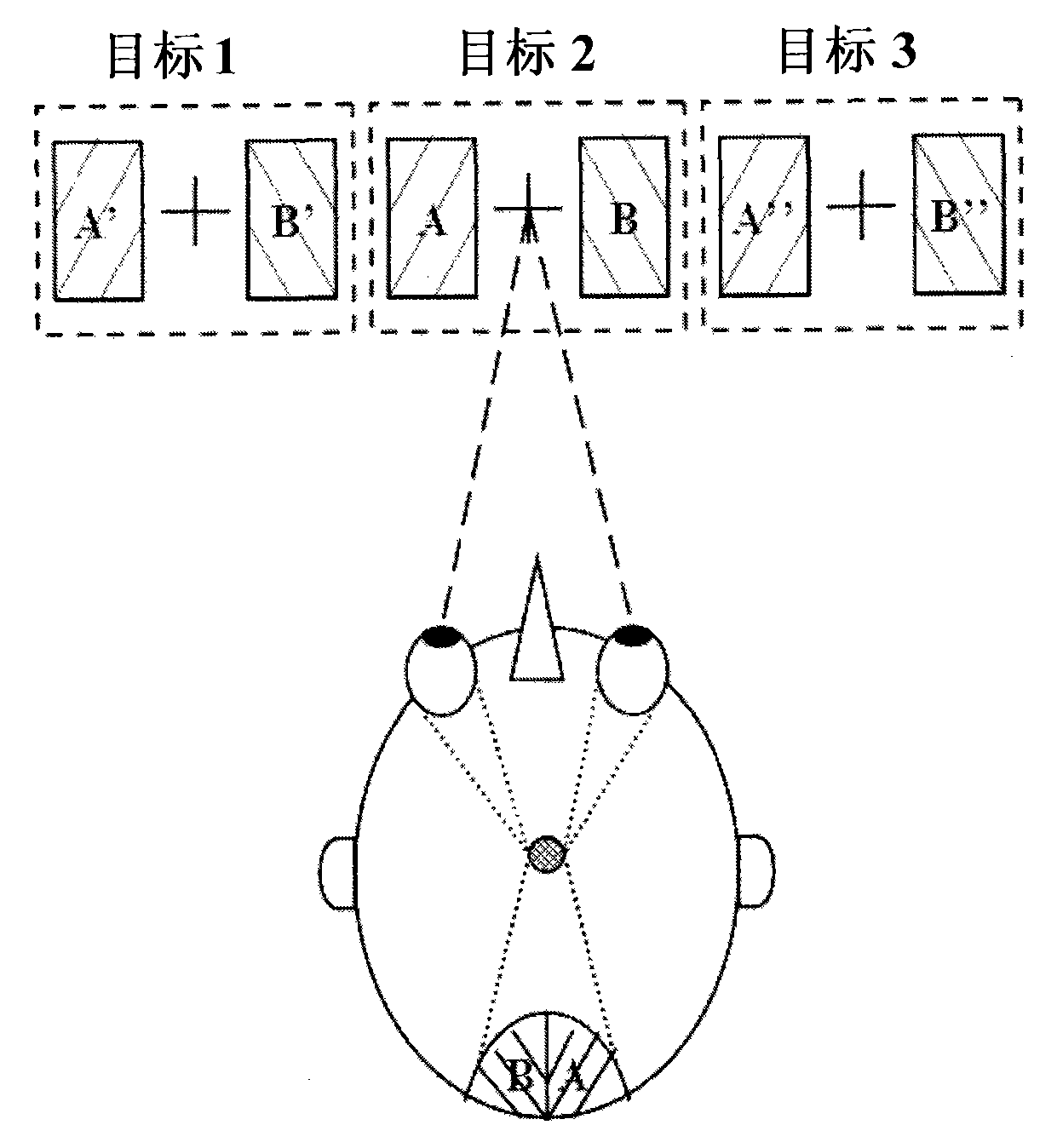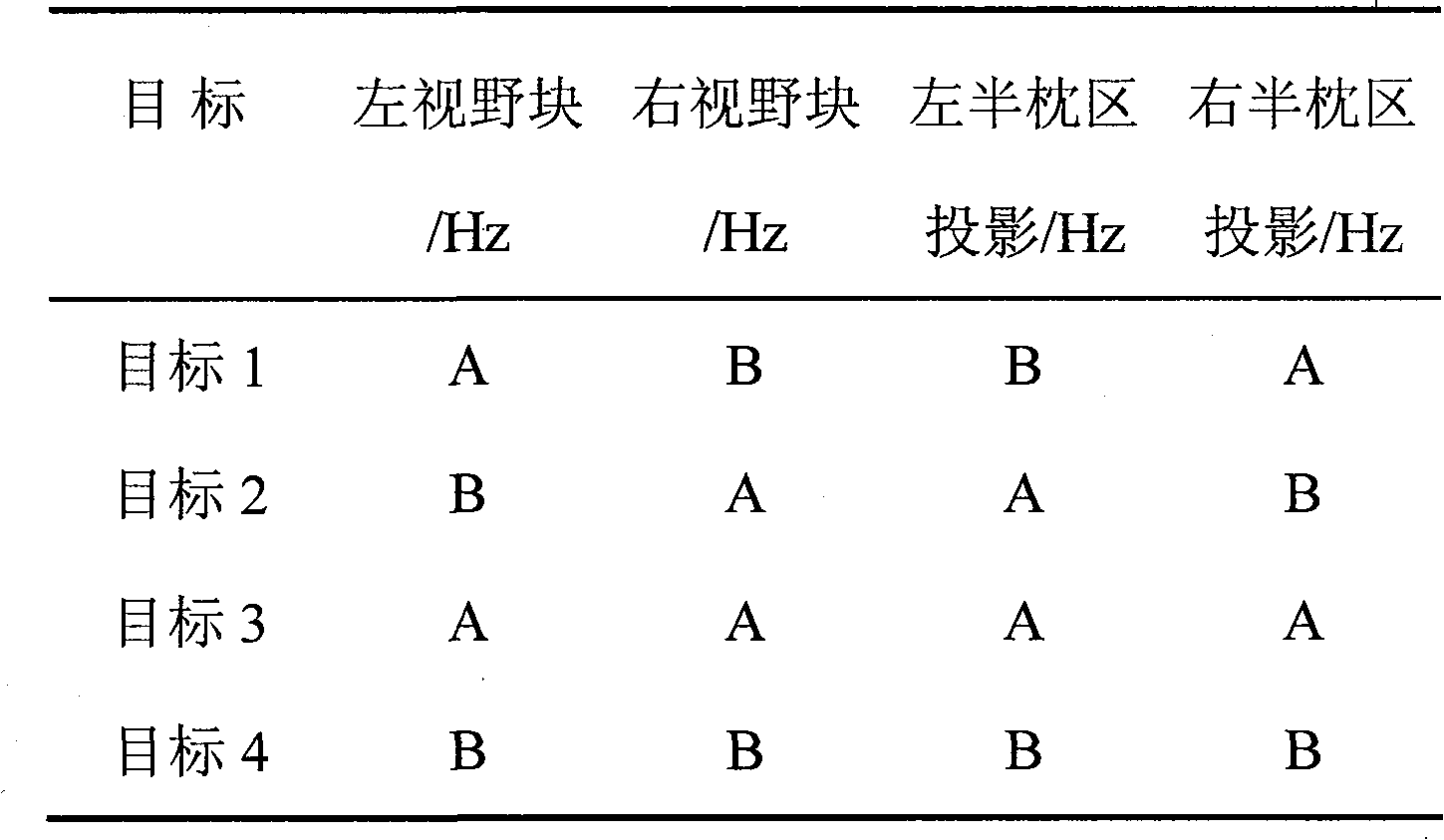Stable state vision inducting brain-machine interface method based on two frequency stimulation of left and right view field
A steady-state visual evoked and brain-computer interface technology, applied in the field of human-computer interaction, can solve the problems of increased selection levels, small selection range of excitation steady-state visually evoked potential frequencies, increased user fatigue, etc., to achieve the goal of increasing the number of , high transmission rate and simple equipment
Inactive Publication Date: 2010-11-24
TSINGHUA UNIV
View PDF2 Cites 0 Cited by
- Summary
- Abstract
- Description
- Claims
- Application Information
AI Technical Summary
Problems solved by technology
In order to make the brain-computer interface system more portable and practical, it is a good way to use a computer screen as a stimulus, but when using a computer screen as a target presentation method, due to the inherent refresh rate problem, the frequency of stimulating the steady-state visual evoked potential The range of options is small, making the number of target presentations limited
For disabled users, fewer objects mean an increased level of choice, which increases user fatigue and complexity of system menus
Method used
the structure of the environmentally friendly knitted fabric provided by the present invention; figure 2 Flow chart of the yarn wrapping machine for environmentally friendly knitted fabrics and storage devices; image 3 Is the parameter map of the yarn covering machine
View moreImage
Smart Image Click on the blue labels to locate them in the text.
Smart ImageViewing Examples
Examples
Experimental program
Comparison scheme
Effect test
Embodiment Construction
the structure of the environmentally friendly knitted fabric provided by the present invention; figure 2 Flow chart of the yarn wrapping machine for environmentally friendly knitted fabrics and storage devices; image 3 Is the parameter map of the yarn covering machine
Login to View More PUM
 Login to View More
Login to View More Abstract
A steady-state visual evoked brain-computer interface method is based on the stimulation of two frequencies of left and right visual fields, and relates to a visual evoked presentation method of a visual brain-computer interface. The brain-computer interface method is characterized in that four different targets are combined through two blinking frequencies by utilizing a principle of the crossing of the left and the right visual fields; and a correlational analysis method is used to identify which target is watched by a user after brain electrical acquisition equipment records a multi-brain electrical signal in the visual brain area. The equipment and the method of the invention comprise a recording mode of the brain electrical signal, lead selection and signal preprocessing, and a feature extraction method. The visual target presentation method of the invention can be realized through a screen display of a common computer, and the size, the brightness and even the color of the target can be controlled easily. Compared with other steady-state visual evoked brain-computer interfaces, the presentation method can increase the number of the targets under a condition that the usable frequencies are limited, thereby improving the brain-computer interaction ability.
Description
Steady-state visual evoked brain-computer interface method based on two frequency stimulations of left and right visual fields Technical field The present invention belongs to the technical field of human-computer interaction, which can help the disabled to operate external devices such as computers, and can also be used for new brain-computer interaction electronic entertainment. Background technique The brain-computer interface system is a communication system that does not require peripheral muscles and nerves to participate. It aims to establish a direct communication channel between the human brain and the peripheral world. By extracting the characteristics of the brain electrical signal, the recognized brain instructions Or the information is transferred to the controlled external device, and finally the brain directly controls the external device. EEG signals are usually obtained by non-invasive scalp EEG recording. Visual steady-state evoked potential is a signal ofte...
Claims
the structure of the environmentally friendly knitted fabric provided by the present invention; figure 2 Flow chart of the yarn wrapping machine for environmentally friendly knitted fabrics and storage devices; image 3 Is the parameter map of the yarn covering machine
Login to View More Application Information
Patent Timeline
 Login to View More
Login to View More Patent Type & Authority Patents(China)
IPC IPC(8): G06F3/01
Inventor 高小榕高上凯洪波闫铮
Owner TSINGHUA UNIV
Features
- R&D
- Intellectual Property
- Life Sciences
- Materials
- Tech Scout
Why Patsnap Eureka
- Unparalleled Data Quality
- Higher Quality Content
- 60% Fewer Hallucinations
Social media
Patsnap Eureka Blog
Learn More Browse by: Latest US Patents, China's latest patents, Technical Efficacy Thesaurus, Application Domain, Technology Topic, Popular Technical Reports.
© 2025 PatSnap. All rights reserved.Legal|Privacy policy|Modern Slavery Act Transparency Statement|Sitemap|About US| Contact US: help@patsnap.com



